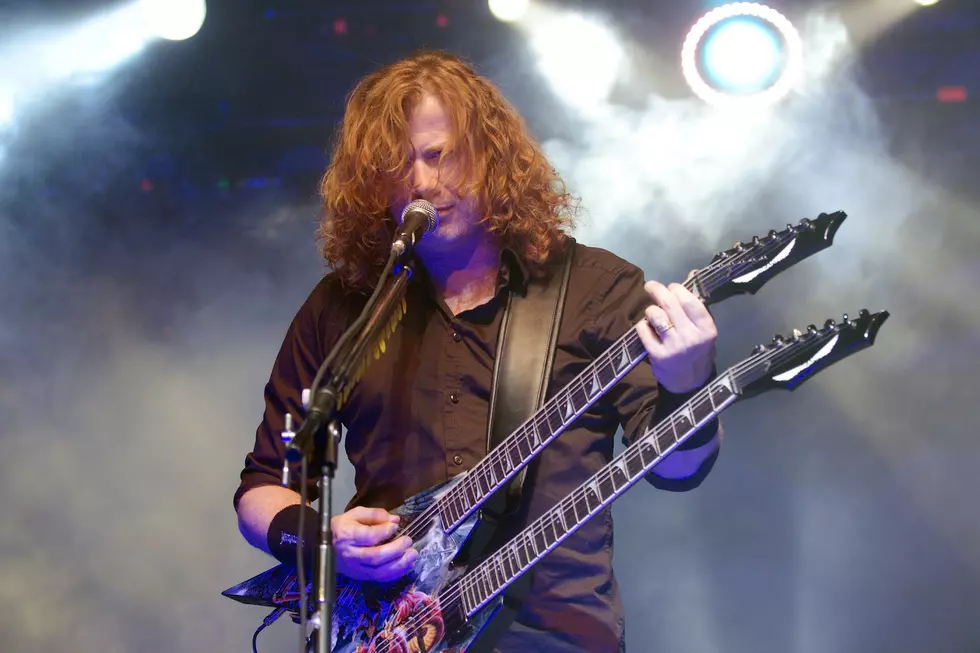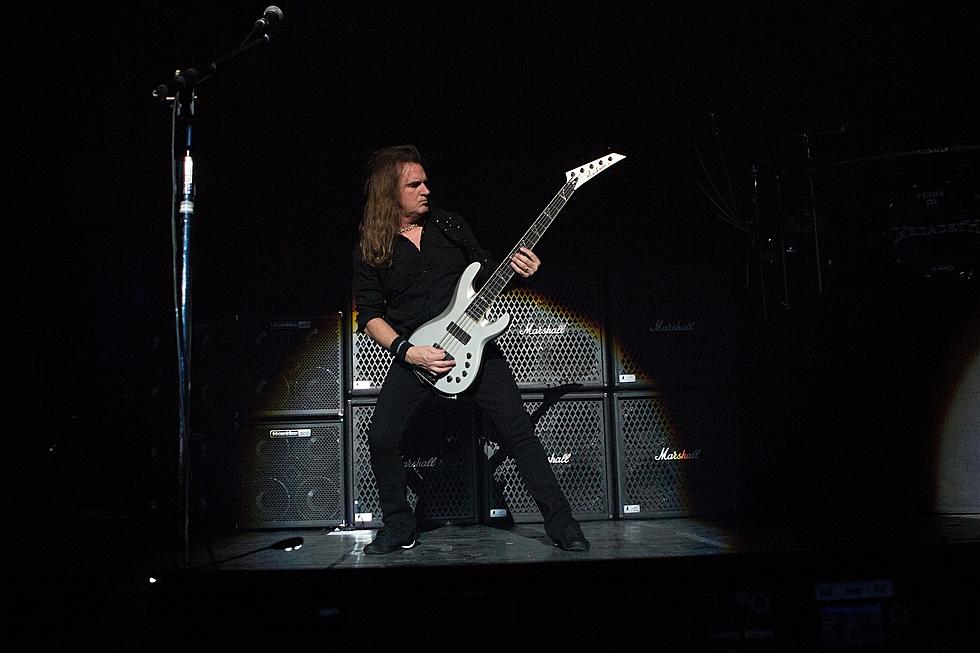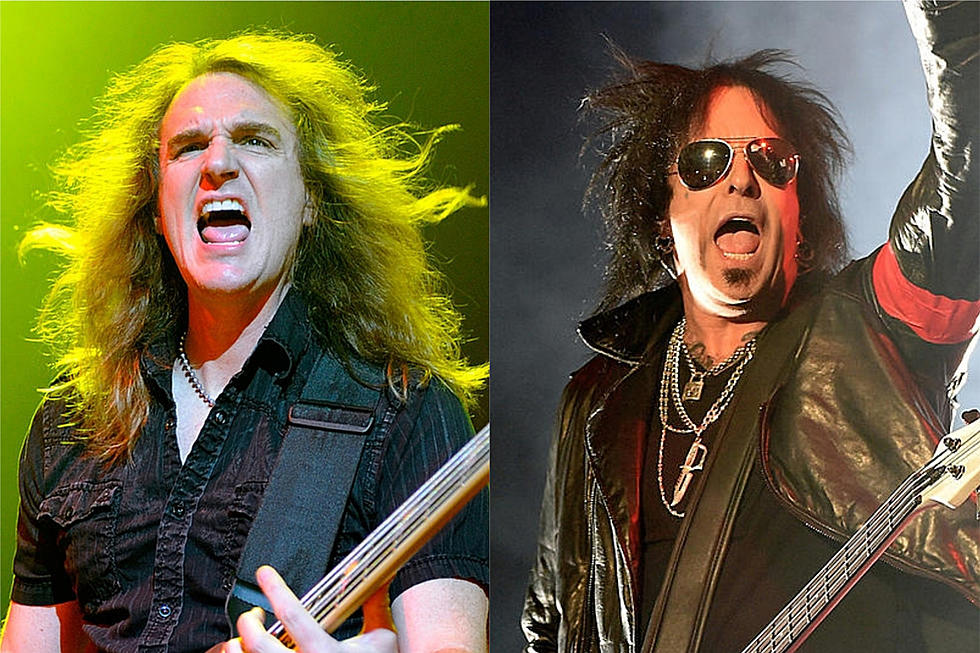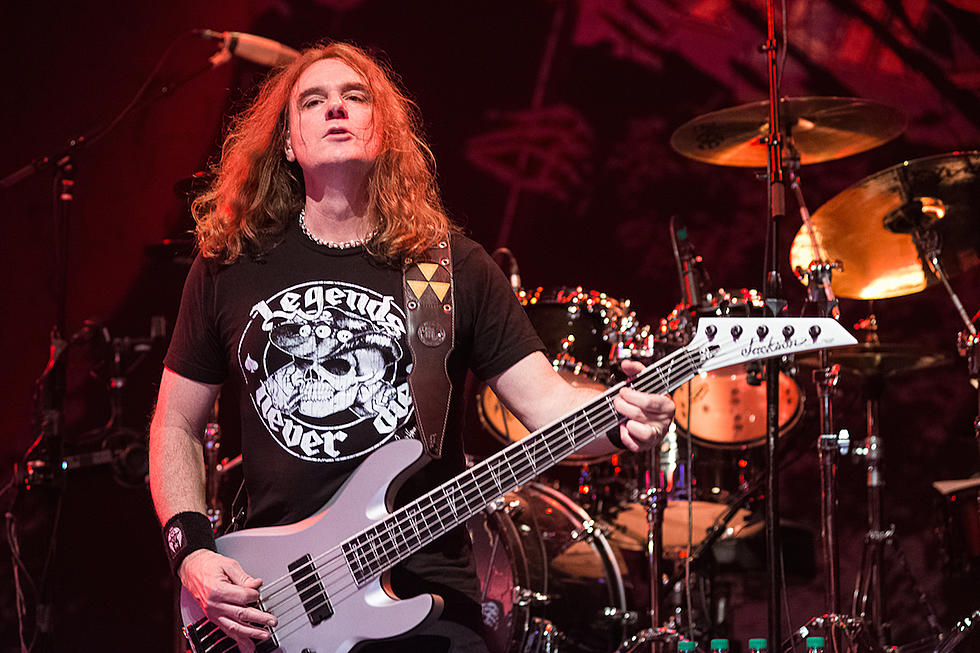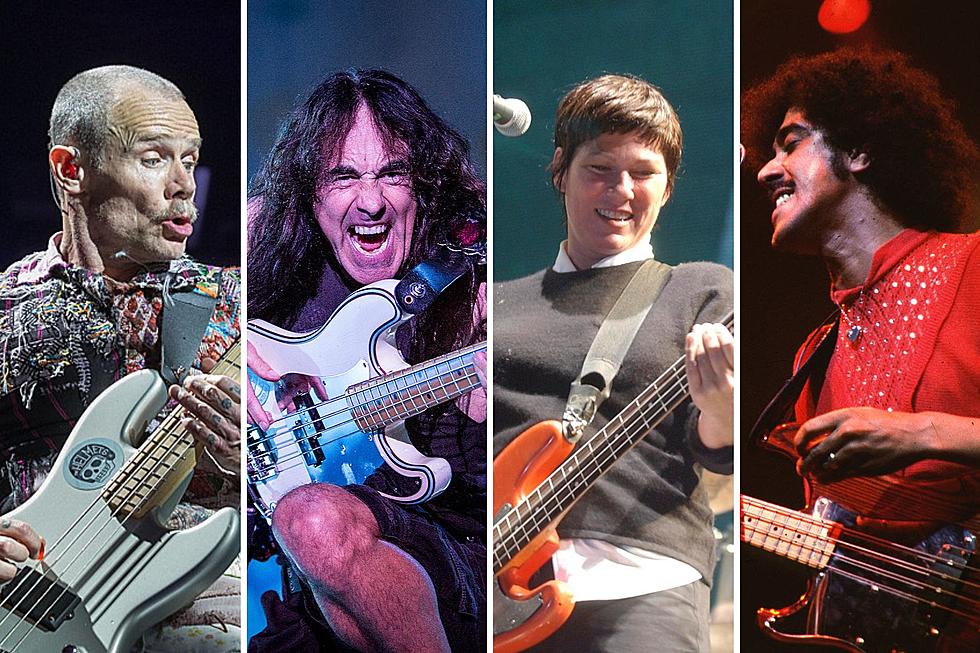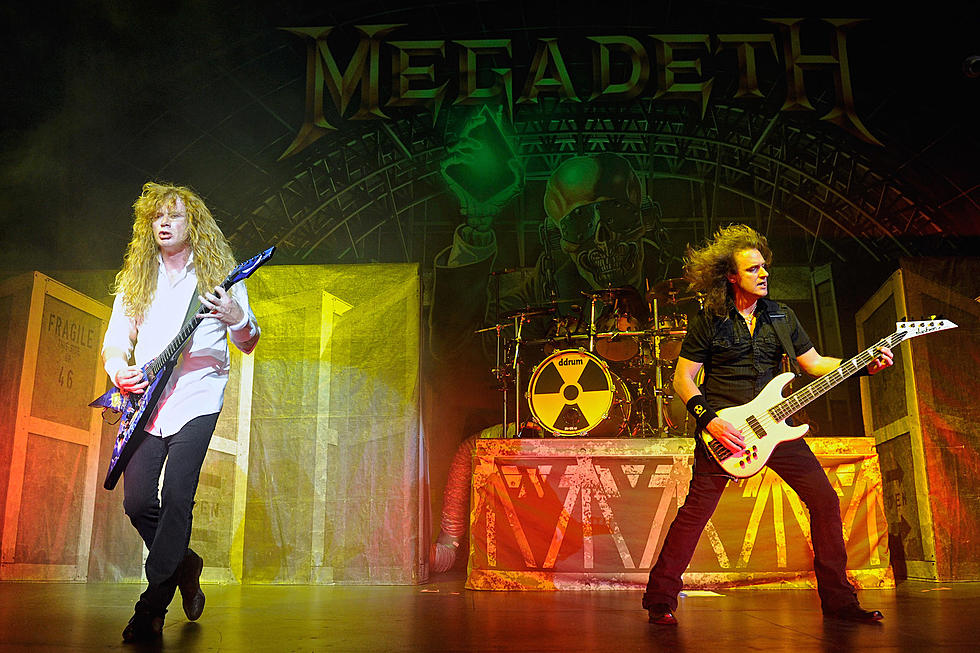
Megadeth Have No Old Song Ideas Left in the ‘Vault’
Altitudes and Attitude are the melodic rock band that unites Megadeth and Anthrax bassists David Ellefson and Frank Bello. The two share a mutual appreciation of '70s rock acts and explained just which bands they were influenced by as kids in a recent interview on Full Metal Jackie's weekend radio program. They discussed more about the new record, Get it Out, as well as the new albums in the works from their respective bands. Check out the chat below.
Some people might be surprised that guys from Megadeth and Anthrax are writing music that's a little less aggressive and a lot more melodic. Where does that broader musical sensibility come from?
David Ellefson: Well, it’s certainly our KISS background or as fans growing up — Cheap Trick. You go back to your influences. These things are formed in your early years as a musician and, try as you might to get them out of your life, they never are.
I think certainly KISS, Cheap Trick, these things — there was kind of the skinny tie new wave movement coming up in the late '70s and then by the time we got into our bands, we got them going by the early-mid '80s. Obviously we were the next generation up to bat with this new sound. But that doesn't erase this whole backstory of our influences.
Frank Bello: Don't forget who you are and where you came from. You can't deny that rock in the late '70s it was big to us. That's who our influences were — KISS, Cheap Trick, Boston, Led Zeppelin and all this stuff. The sponge of your mind — this comes into your life.
So, don't forget where you came from, then it became metal for us. The melody is very important to me, I like things that sound good. I I like a good riff — a good heavy riff, but with a good melody on top. I've always been like that. I don't forget where I came from.
David, you are from farm life in Minnesota. Frank, you're up in The Bronx in New York. What is the commonality that connects you guys personally and musically?
DE: Well, good question. "Detroit Rock City" — it always comes back to KISS.
FB: Every interview we do, somehow somebody brings up something that goes back to KISS and we relate to it. But I think it's music and, and honestly those great bands from the late '70s and early '80s. I think it always comes back to that, and David and I, obviously, we've been through this metal thing for a long time together. I just found when we started writing together, there was a click. It really clicked in. It was very easy and I just think we had a lot of similarities. It really worked where I could bounce off of him, he bounced off of me. It was no drama and it was a very easy process. So I think that led to the openness of what you hear on these songs.
This band doesn't take precedence over Anthrax or Megadeth. It's basically for fun. What's different about making music without any responsibility of living up to an expectation?
DE: It is [fun], very much so. But a part of this process — we funded it ourselves. We'd had to find these little windows in between our schedules to make it work. We'd call our producer Jay Ruston in Los Angeles and we would go out and we would meet, we'd have to get [drummer] Jeff Friedl. He's super busy now, he's in basically every one of Maynard James Keenan's bands not called Tool, so he's very busy. But we got him in a season when he was coming up the ranks. Same with Nita Strauss — I always joke if we'd get Nita now, she probably wouldn't even return our phone calls because she is a big rock star.
FB: It's funny cause I saw Nita at the Dimebash, and she's the first one that came up to me and goes, I want to jam with you guys. We got to do that song live.
DE: I know. She is so awesome. She's so cool. Awesome. Yeah. Everyone we got on this record are those people. They're the people that say yes, they participate. They didn't come in going, "Wow, I gotta have my manager call your manager and negotiate the money" — none of that. There was none of that. It was like, "Look, we don't even know if there's going to ever be any money, we're not doing it for a financial thing. We're just doing it because we're just trying to put some tunes together and have some fun doing it" and it seems like everybody caught the drift of that.
FB: Thankfully. That's the best thing about this. It's that people are getting it because they know this is honest. It's just who we are. It's not trying to do anything, it's not a genre thing. "He's trying to do this" — we aren’t trying to do anything. We just want to write a good song. That's all this is about.
There are some high profile guest performances on this. People like Ace Frehley, Gus G, Nita Strauss. Musically to you, what connected each guitarist with the particular track they were asked to play on?
DE: You know, we would usually finish the track at Jay's place at the studio and there would always be this - you know we need to get someone to fill in a solo here. Jay was very good about going, "How about Satchel from Steel Panther?" And I gotta say, that was one track that I did not expect.
FB: Incredible. I love what he did.
DE: All it was was a bass part and I think I'm talking to Frank going, "Man I think we should write some lyrics - what do you want to talk about in this?" It was one of those songs, we never - life kind of tells you what's gonna go down. You can't force something, but on this record we were very - we let the music really take us on the course where it was supposed to be. That was one of those songs for me, that it never went into the lyric thing. All of a sudden, Satchel sends back this guitar work that was just incredible and everything — Michael Schenker — just awesome. We looked at each other and said, "That's done."
FB: That's done. Just don't touch it because that piece he did, you don't hear guitar playing like that. You just don't hear it. That guy is so underrated as a guitar player, a lot of people know him, but he should be known by everyone. Every guitar player should know that dude.
DE: Another guy that came in is Christian Martucci from Stone Sour and all through the process I kept asking Jay, "You said you know a guy that can just sort of flesh out, doesn't have to be wailing lead solos just kind of textures and clean tones and different things." Because that is a very unique skill set for people to be able to do that, and it's not something for everybody, in fact, there's a very limited amount of people who can really pull that off. Oh my gosh, when we found Christian and he gave a track back we were like, "Oh my God, you are the guy we've been looking for."
FB: It’s little flavor pieces and he sprinkles flavor all over the song. I mean he played on the song, "Get It Out." The solo alone is awesome, but then he sprinkled these little great tasty little, I call them flavor cause they, he make you want more as it is so good, man. I love it. I'm close with Christian, he's a great dude.
Anthrax and Megadeth are still as potent as ever. They're both releasing albums that stand up to anything in your respective catalogs. What have you learned about balancing what appealed to people in the past while creatively satisfying a need to move forward?
DE: Good question. I think Dystopia, our latest album, that was the one that really defined the new course. We finally set the course and I think a lot of it — the '90s were so not metal friendly. [laughs] I mean, I think we were making our biggest mainstream records by the early '90s MTV. That was our season. We were in favor, we were the hip cool bands.
Then that Seattle showed up and, Nirvana, Pearl Jam, that whole movement just really — people's listening tastes changed. The media went after that and we went back underground to a large degree. The beauty of that is our fans made us — they made our bands. It wasn't the mainstream media. That helped, it helped prop some things up, but the fans made us who we are because we played music basically as fans for the fans and that has carried us through.
So despite gold, platinum, Grammy or otherwise, that's the undercurrent that that is really there in it. With Megadeth we were really consciously trying to re-correct our course that got skewed a little bit in the late '90s. With trying to write songs to have this mainstream appeal at some point I think we all realize it's like, you know what, as long as we just make music we like, our fans are gonna like it and everything's gonna be okay.
FB: It's true that with this writing with Anthrax is the same thing. You can't not be a fan. I mean we are, we are fans playing music to other fans. That's exactly it. Don't forget, again, go back to, don't forget where you came from and who you are and that will lead you right. I don't want to try it and do anything I'm not — we are real people. I'm not interested in that other garbage.
I want to do something that turns me on to get this fire in my belly out. I need to feel it and everything, I mean we're writing now, everything we're doing right now, it's got to come straight from the gut and it's got to set you on fire. It's got to make me want to do this and get out there and just rage and I think that's really important and going forward.
What can you tell us about what is going on with Megadeth and with Anthrax? I know there's a Megadeth anthology coming out.
DE: Well, the greatest hits, Warheads on Foreheads, that's basically just a celebration of the 35 years of Megadeth. The calendar will turn pretty much of June 1 of this coming year because that was when Dave and I met. We met, uh, the first week of June in 1983 it was in June of '83 that Megadeth formed officially.
We had came up with a name and that was when it started. So basically that greatest hits is kind of the closing up of this 35 years and Megadeth campaign that we've been on this whole last year, which has been good because we've been off the road. We did about eight weeks of shows, maybe at the most in 2018.
Europe, Indonesia and the vault is empty of any riff. You know, we've kind of always had this sort of lingering stock pile of things left over from maybe the Youthanasia record, Cryptic Writings, just scatterings of things.
We're talking like calling our home back when they used to have the Panasonic tape voice recorder at home calling the voice recorder and singing a melody into it you know, like, like sifting through all that. That's now gone. It was like we have worked through all that stuff. Which is great because we really have a really a blank clean slate that we've been working from and coming up with this next record. It's awesome.
How's everything going with new music from Anthrax?
FB: Great, it’s a unified, unified band — hungry. The great thing I feel within the nucleus of the band is it’s a very hungry band, which is great. I like seeing that in the eyes of everybody because there's something to prove, whatever that means.
I don't even know what that means, but I could see this and intensity, I think anger is good for these songs. I think it's going to lead to heavy and fun stuff in the future. Whatever - I'm just excited because I love this music. That means I get to play it onstage. I'm looking forward to it.
When you guys were kids, who could have known everything Megadeth and Anthrax would achieve. What's the most unimaginable thing that happened to each of you with your band?
DE: I always felt when I met Dave that - he's a very larger than life personality. It was important to me, being a kid from a farm, knowing this and having worked hard. I had a work ethic. I had done my time in the clubs back in the Midwest. I was a teenager, this is how long I've been doing this.
I meet Dave and he had a persona that was as equally as big as the people of the posters I had on my wall. Be it Iron Maiden, Van Halen, KISS whoever. I was like, this is the real guy. L.A. at that time in the '80s, probably still till this day, but certainly then, it's hard to sift through who's the Nikki Sixx wannabe, the David Lee Roth wannabe. Who are the real guys?
It was great to be able to meet and partner up with Dave as, again, a real guy who had a new sound and a new vision and we formulated that band really before we played any notes together. The vision was cast and everything we do with it, basically aims towards that vision. That's very different than, "Hey bro let's get together and jam and see if anything comes out of it." It's just a different way of doing it and I always felt like it's where we are, and what happened, as a band.
FB: For me, if you would have told me when I was 13 years old, a guy in The Bronx growing up 10 minutes from Yankee Stadium, that we were going to be able play Yankee Stadium one day in a rock band, in a metal band, and we did that. I still say, "Wow, we played Yankee Stadium."
A Yankee fan, that's a kids dream think about that. Not playing baseball in Yankee Stadium, I played a damn show and it was a big show at Yankee Stadium and I had my family there. The great thing about this, not to bring something down, but my grandmother's last performance of Anthrax that she saw was at Yankee Stadium in a box. It's very special to me and I'm very thankful for that. I'm thankful to Metallica, this business and this music has been great to me and I want to pay it forward. It means a lot to me.
Thanks to David Ellefson and Frank Bello for the interview. Grab your copy of Altitudes and Attitude's 'Get it Out' here and follow the band on Facebook. Find out where you can hear Full Metal Jackie’s weekend show here.
See David Ellefson and Frank Bello in the Top 66 Hard Rock + Metal Bassists of All Time
More From Classic Rock Q107



